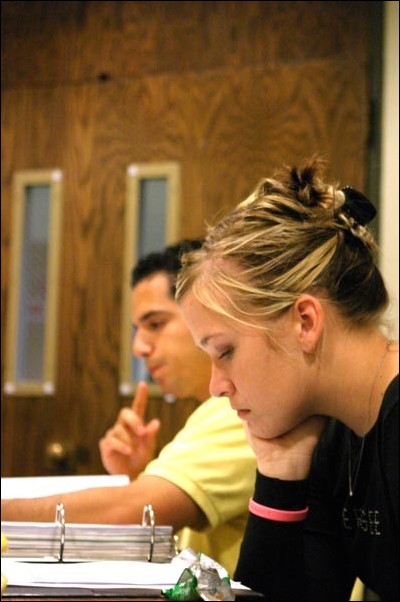Program wins battle over funding
Image: Program wins battle over funding:The finance and budget committee, which includes ASI executive vice president Angel Barajas and VP of University Affairs Colleen Ripchick, voted to redirect funds for several campus programs on Monday. Andrew Nixon/State Hornet:
May 11, 2005
The Associated Students Inc. finance and budget committee voted Monday to take $5,000 in funding away from three campus programs to help fund the Lesbian, Bisexual, Gay, Transgender, Intersex, Ally and Queer program in the 2005-2006 budget.
The finance and budget committee voted to redirect $1,500 from the Women’s Resource Center and $1,750 each from the cultural affairs program and Career Center to support the program.
Despite the reduction, the cultural affairs program would still receive the largest increase in funding out of the 18 programs requesting grants, with $43,250.
In the 2004-2005 budget, cultural affairs received $34,515.
The Women’s Resource Center grants would drop to $30,000 and the Career Center would drop to $15,091.
James Shelby II, newly elected ASI president Angel Baraja, and Colleen Ripchick, all ASI board members, make up the budget and finance committee.
Barajas said the decision to take funding away from all three programs will not have a significant negative impact.
“It’s not taking away from student jobs, they’re still able to run efficiently,” Barajas said.As for cultural affairs, Barajas said it was a hard decision, but the program will “not be affected too much.”
Initially the ASI budget proposal contained no funding for the Lesbian, Bisexual, Gay, Transgender, Intersex, Ally and Queer program, after they had asked for $13,000 in grants.
However the board changed its mind after hearing objections, including accusations of discrimination from members and supporters of the program.
The board then sent the budget back to the finance and budget committee to find $5,000 for the program.
“We need to send it back to finance and budget for a reasonable determination of funding,” said Shelby, ASI vice president of finance, at the board meeting. “We need to look at what they’re asking for.”
The ASI board will vote on the committee’s recommendation to redirect funds from the three programs at today’s meeting.
Patricia Grady, coordinator of the Women’s Resource Center, was one of many supporters of the program who spoke to the board in hopes of changing its mind.
“I’m really proud of the board taking that stand to support our differences and send a clear message,” Grady said.
Lori Varlotta, vice president of Student Affairs, made a promise to the program that the Student Affairs office will also dedicate $5,000 from their general fund, in addition to the $5,000 ASI will give.
A total of 18 programs received ASI grants. The total amount of grant funding for all the programs will be more than $260,000.
Bonnie Sugiyama, director of the Lesbian, Bisexual, Gay, Transgender, Intersex, Ally and Queer program, said she was pleased about the decision.
“My only hope is they don’t take the majority of the funding from the Women’s Resource Center,” Sugiyama said.
If the changes are approved today, the ASI budget would set aside $30,000 in grants for the Women’s Resource Center, down from the $31,500 originally dedicated.
Shelby said he’s against taking money away from Recreational Sports because they serve about 2,000 students.
Under the budget proposal, Rec Sports would receive $53,764 in ASI grants, an increase of $3,853 from the 2004-2005 budget.
Josh Wood, outgoing ASI president, said he will support the original budget proposal, but not the committee’s recommendation. Wood believes the university is creating programs that neither they nor ASI can adequately fund.
Educational Opportunities Program, a retention program for low socio-economic students, would receive $7,000 under the budget proposal.
“These are all university programs and they’re coming to us for help every year,” Wood said.
“The Student Affairs office needs to take more responsibility.”
——————————————————–
Greg Hyatt can be reached at [email protected]







































































































































